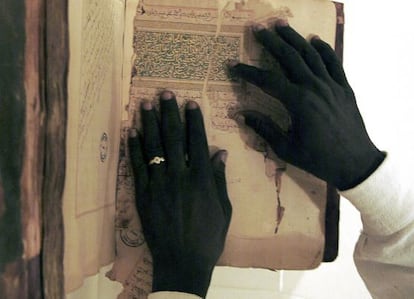Guarding the legacy of Al-Andalus
Ismael Diadié fled his native Mali after saving 7,000 priceless documents

Ismael Diadié comes from a family steeped in half a millennium of history. "I am one of more than a thousand people who have had to leave Mali to take refuge in other countries," he says in a calm voice. The last descendant of Mali's Kati dynasty, he is now settled in Spain, having passed through Switzerland and France, after being forced to abandon his country in April of last year when Timbuktu fell into the hands of Islamist forces. He left behind thousands of manuscripts relating to Moorish Andalusia preserved since the 15th century, which he had inherited from his ancestors and, along with his father, had personally recovered during a village-by-village search at the end of the 1990s.
"We haven't lost documents, though we have had to spread around a large part of the archive," Diadié pointed out last Wednesday in the Andalusian city of Jaén, where he had traveled to talk to students about the conflict in Mali and the destruction of its heritage. He said the documents that had remained under the care of his driver, Baba Pascal Cámara, in the Timbuktu Andalusian Library - also known as the Fondo Kati - had also been saved. Cámara hid and protected them from radicals who made continuous visits with the clear intention of doing away with them. Not so fortunate were thousands of documents at the Ahmed Baba center, which were burned.
Diadié is the last descendant of the Kati dynasty, which hails from Toledo
The Timbuktu Andalusian Library is one of the world's most important bibliographic resources pertaining to Al-Andalus, comprising over 7,000 documents from different time periods. It has been partially financed by the Andalusia regional government, which in 2002 invested 120,000 euros in the form of a grant to construct the building that would house the documents. The move was prompted by the publication of a manifesto defending the archive signed by writers such as the late José Saramago, Antonio Muñoz Molina and Juan Goytisolo, and propelled by the late poet José Ángel Valente.
The agreement with the Andalusian government went even further, including plans for the dissemination of that legacy. "The plans with the regional government were unable to be fulfilled due to circumstances beyond our control - it was impossible to invest after 2010 as Timbuktu was in a redline area," admitted Diadié, who met with the Tres Culturas del Mediterráneo Foundation last week about resuming the collaboration agreement.
He fled Mali after Timbuktu fell into the hands of jihadists in April 2012
Diadié's recent life is worthy of an adventure movie. In Jaén he explained to students that he and his father rescued their legacy after finding out they were descendants of Ali ben Ziryab al Kuti, who was born in Toledo but left the city in May 1468. Al Kuti eventually arrived in Timbuktu, carrying with him the first manuscripts of what over the centuries would become a vast family archive.
During the 19th century, before the fear that regional instability might put the archive in danger, the manuscripts were distributed among different members of the Kati clan. Diadié and his father went from village to village and managed to save 3,000 documents dating from the 12th to the 19th centuries. At least 300 of these were by Andalusian authors, 100 were by renegade Christians, 60 by Jewish merchants and the rest were on different Arabic topics. The library is fundamental to the understanding of the penetration of Islam in Spain and also the fate of hundreds of Visigoth families after the fall of the kingdom of Toledo.
"You cannot conceive the history of Mali without the history of Al-Andalus," explains Diadié, who remains skeptical about the future of his country. "It is going to be the future of any state that has oil, natural gas and uranium, which is to say, an uncertain future."
The library is key to the understanding of the penetration of Islam in Spain
He openly distrusts the presence of French troops. "There are no good Samaritans in international relations. There are always interests of every type," he says.
Diadié condemns the continuous breaching of human rights since a military coup in April 2012, which have included summary executions, the cutting off of hands, the raping of women and the destruction of a valuable artistic heritage, which has included the loss of 16 mausoleums and irreversible damage to world heritage site mosques. It's these sad memories that now haunt the thoughts of this faithful guardian of the legacy of Al-Andalus.
Tu suscripción se está usando en otro dispositivo
¿Quieres añadir otro usuario a tu suscripción?
Si continúas leyendo en este dispositivo, no se podrá leer en el otro.
FlechaTu suscripción se está usando en otro dispositivo y solo puedes acceder a EL PAÍS desde un dispositivo a la vez.
Si quieres compartir tu cuenta, cambia tu suscripción a la modalidad Premium, así podrás añadir otro usuario. Cada uno accederá con su propia cuenta de email, lo que os permitirá personalizar vuestra experiencia en EL PAÍS.
¿Tienes una suscripción de empresa? Accede aquí para contratar más cuentas.
En el caso de no saber quién está usando tu cuenta, te recomendamos cambiar tu contraseña aquí.
Si decides continuar compartiendo tu cuenta, este mensaje se mostrará en tu dispositivo y en el de la otra persona que está usando tu cuenta de forma indefinida, afectando a tu experiencia de lectura. Puedes consultar aquí los términos y condiciones de la suscripción digital.









































